“Senseless violence is a prerogative of youth, which has much energy but little talent for the constructive.” - Anthony Burgess, A Clockwork Orange
Often enough it is seen that anti-shippers are viscerally put off and disgusted by anything sexual in regards to characters they have determined to have some kind of personal significance. Sexualization of characters they feel mimics a sexualization of their own bodies and as such they see it as a crossing of their own personal boundaries. When they see trauma mirrored in fiction, they take it personally, assuming that their own trauma is being enjoyed by wicked spectators. But there is an aspect of art and fiction in the modern day of which antis are quite fond: Violence.
Violence in fiction is something of a paradox for anti-shippers as it betrays their carefully crafted logical arguments against “proshipping” even if they try to twist and bend their way around it. Their arguments against sex and abuse and “unhealthy” aspects of fiction are based around the proposition that seeing certain things in a fictional context will cause others to commit the same atrocities as the glorification of those vices is a passive encouragement. Why, then, would this not apply to violence? Already, some anti-shippers have determined that some ships are off-limits due to the abuse that is depicted in canon between the characters being shipped, an example being the ship between Bakugou and Izuku from My Hero Academia (ship name BakuDeku or BKDK) as antis claim Bakugou’s treatment of Izuku precludes a “healthy” ship dynamic. If “abuse” is an aspect of fantasy that is inexcusable to anti-shippers due to the “unhealthy” nature of it, how do they reconcile their logic to exclude instances in which characters commit heinous crimes or self harm?
The reality is: They can’t. Most, if not all, of anti arguments concerning their love for violence and gore are based on their emotions—that is, they cannot and will not go into any great detail about why violence and gore are acceptable, only that it “doesn’t count” as proshipping because “there aren’t any ships.” This narrowing down of the definition of “proship” is very on brand for antis as they begin to whittle it down to sexual instances only in order to preserve their own ability to enjoy art and writing with gratuitous gore. Ironically, some antis have begun to use proship rhetoric in order to protect their own interests, as is seen by the posts by Twitter user yotachangf who insists that “drawing gore isnt bad” [sic] and that those who don’t like it can choose not to interact with it (literally the definition of proship).
One of the arguments on behalf of gore over sexual themes is that of “artistic value.” This is one of those aspects of obscenity laws that often gets whipped around here and there and brought up among those who believe in the censorship of certain materials over others: when there is an “artistic merit” to a work, it is generally exempt from obscenity laws. Nevertheless, gratuitous violence is almost never considered of “artistic merit” under the standards of obscenity legislation, it is merely acceptable due to the United States’ relationship with their military industrial complex and the glorification of violence as a tool to recruit young citizens into the armed services. Unfortunately for antis, their memories seem to be somewhat faulty in regards to some of their favorite violent media as some have claimed to enjoy Evil Dead but conveniently forget the graphic rape scene of which they should not approve. Twitter user ramunerl hilariously brings up notorious freak Clive Barker’s hyper-sexual horror film Hellraiser as an example of a bonerless film, implying indignation that anyone should be finding gratification in one of the most sexual franchises of all horror history. These truly are the sorts of people who might watch A Serbian Film and conveniently “forget” the entire premise of the film.
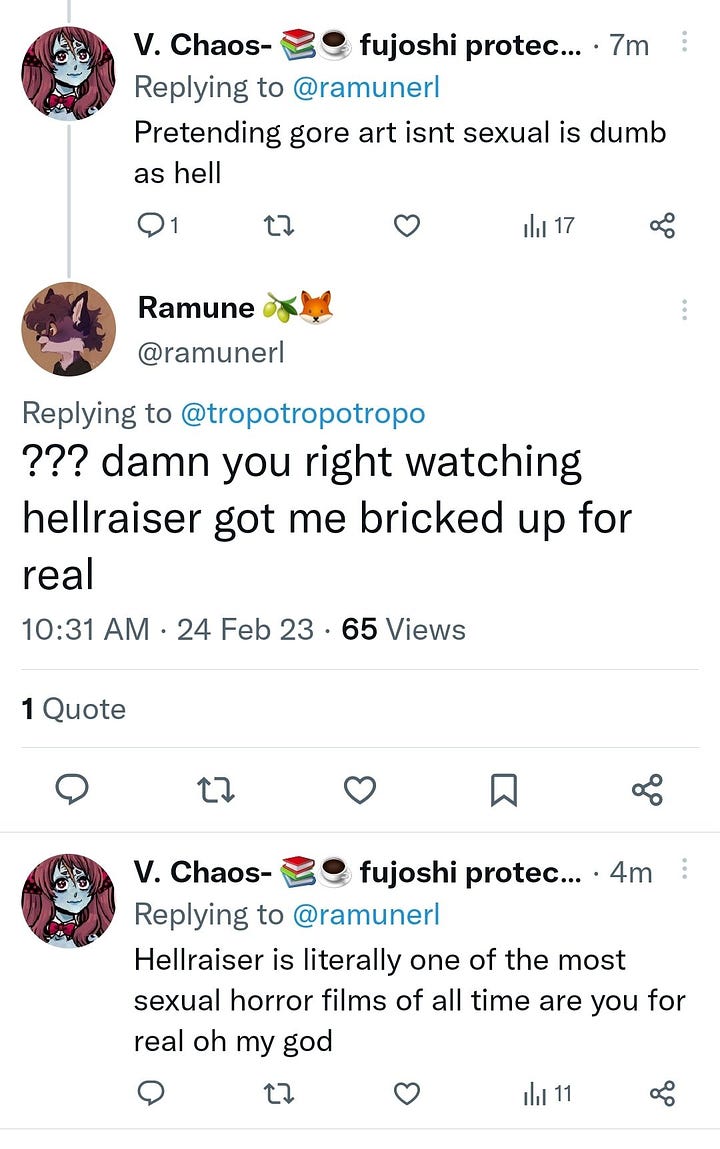
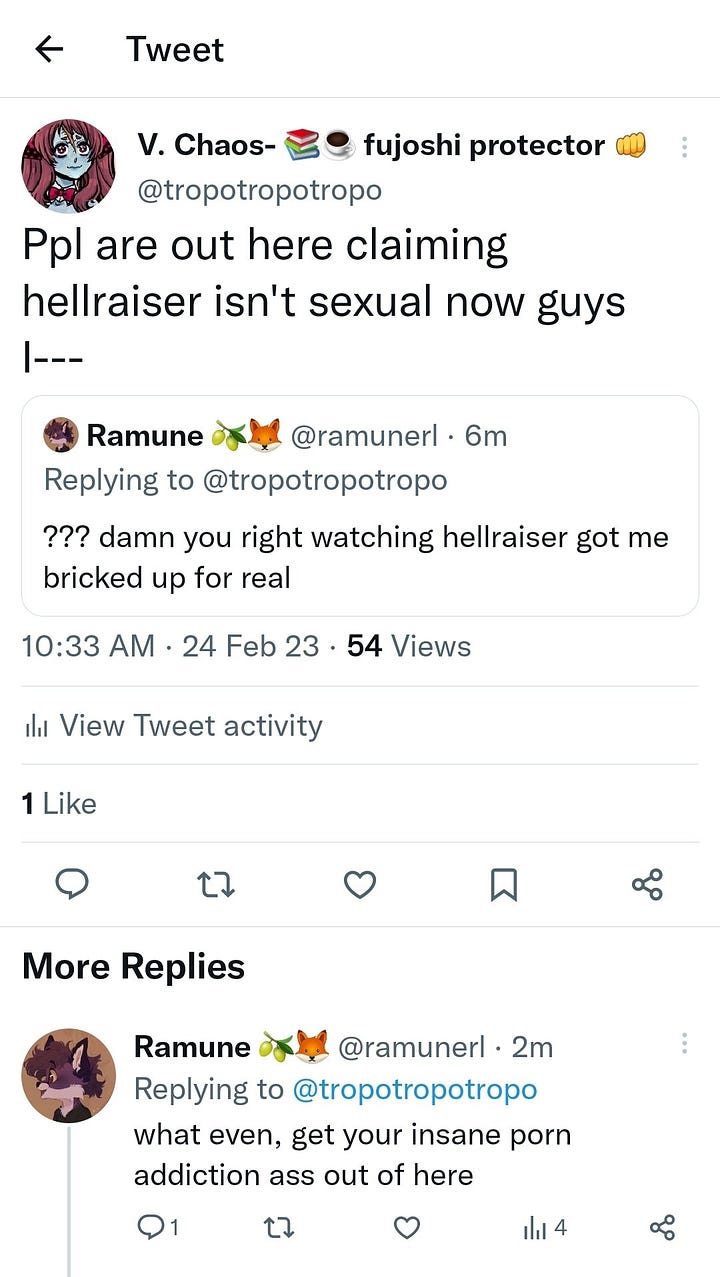
Granted: all of this really does mesh up quite well with the anti method of thought. If they consider sexual abuse or pedophilia to be as awful in fiction as it is in real life, then it would stand to reason that they believe that gore, violence, and murder are perfectly acceptable in fiction since they seem oftentimes very eager to wax poetic about their wishes to commit such violence in the real world. Anyone who has been around in fandom spaces should be quite familiar with how frequently antis make known their fantasies about murder or the deaths of people they consider to be morally depraved, their lust for violence oftentimes overtaking them enough to directly contact those they wish would die in the hopes that their words might inflict real harm upon those people. Strange, wouldn’t one think, for a group of people who believe in protecting the public from (sexual) harm to directly wish for the death or harm of others and to glorify not only fictional but real life violence?
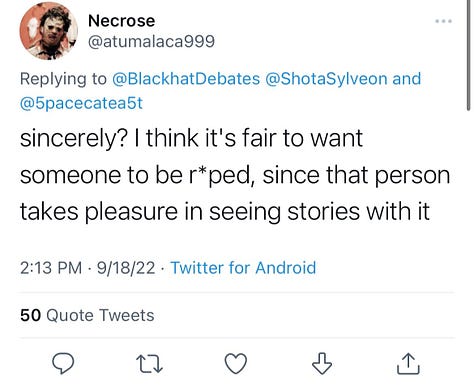
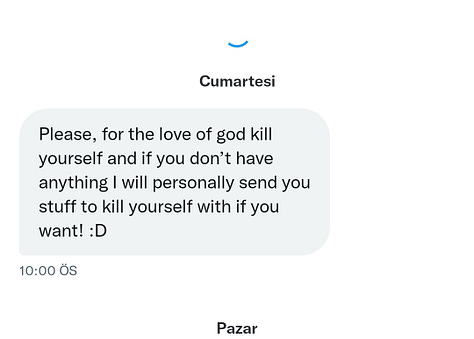

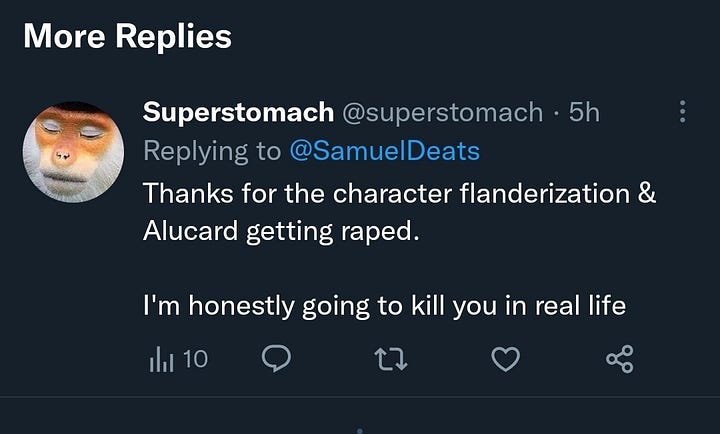

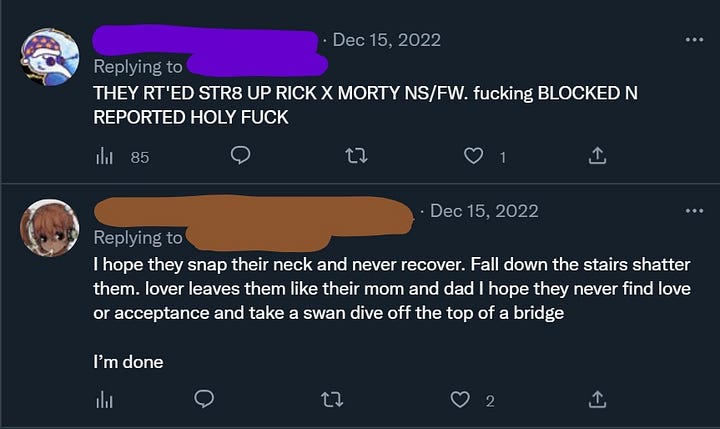
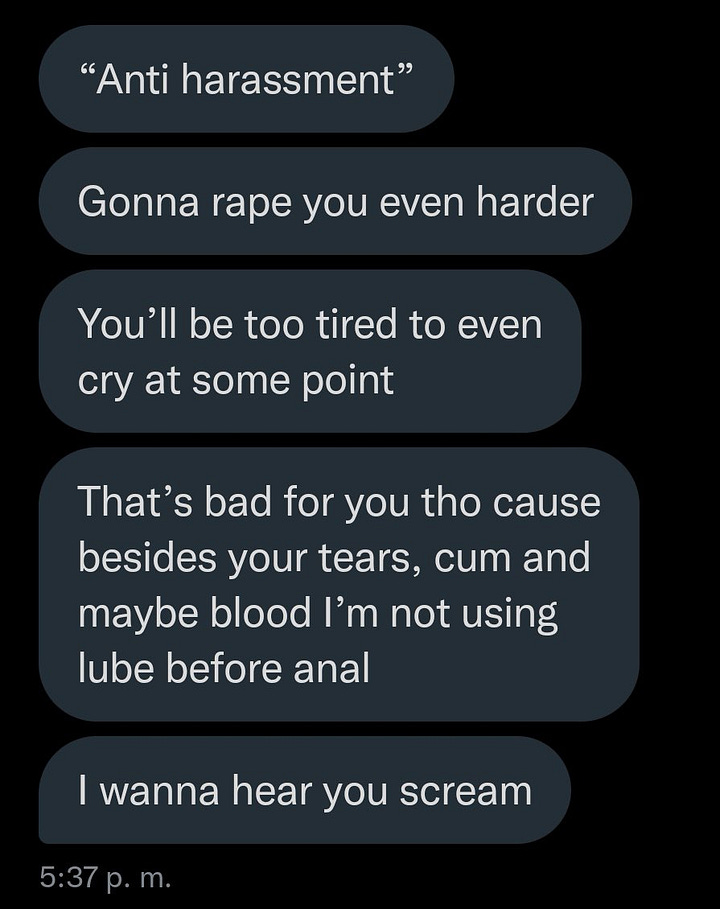
The cognitive dissonance it takes for someone to claim that sexual abuse in fiction is evil due to its ability to make people think it’s alright to commit in the real world and then turn around to direct message someone graphically threatening to rape them, is an incredible feat and certainly jaw-dropping here. This glorification of violence, including sexual violence, as long as it is committed against people they believe deserve it, is 100% permissible and even sometimes considered an obligation for anti-shippers who believe it to be part and parcel with their moral crusade—after all, one of the most important things for them is to make certain that degenerates are suffering. If one could theoretically deduce that the morals of kinksters are indicated by the types of fanfictions they enjoy, one could similarly deduce that the morals of anti-shippers are very clearly on display in regards to the types of fantasies they voice on Twitter about stalking, raping, killing, and encouraging suicide—the difference being that proshippers’ fantasies are centered around fictional people and antis’ fantasies are very clearly centered around real live human beings.
One theory as to why antis are like this is simply based on the concept that so many of them are affected by the general hopelessness and malaise of their generation—they’re young enough to have plenty of energy but ignorant enough that their incompetence gets in the way of their plans. It is easier and more fulfilling to them to begin to destroy things, much like a younger sibling might smash their older sibling’s freshly-built block tower. If they cannot create with the same skill and be recognized as a unique talent, they will seek to bring about the destruction of those they feel are in their way. It is not that they are actually morally against any of these aspects of fiction, it is only that these are the groups and communities that give them validation for their destructive efforts—that praise them for their violent fantasies against proshippers and encourage them to lash out with emotion. This would account not only for anti-shippers who enjoy gore and horror works but also those who are part of the furry community (how does one not make the connection to bestiality?) or other kink-based communities that seem like they should be excluded from anti acceptance. That some of them have to resort to proship rhetoric to defend their own taste is quite telling indeed, and supports this theory.
Whatever the case, proshippers who enjoy gore are going to sit back and make sure to very much openly enjoy every horror film they come across whether it be Hellraiser, Midsommar, or Cannibal Holocaust. Antis might enjoy those films as well—but how well they might be able to talk about them within their in-groups is unknown. Whether or not they might be able to grasp even just the surface-level themes and dig deeper into the meat of the movies—well…that remains to be seen. After all, so far they haven’t been very good at media literacy, social interaction, or basic common sense.



